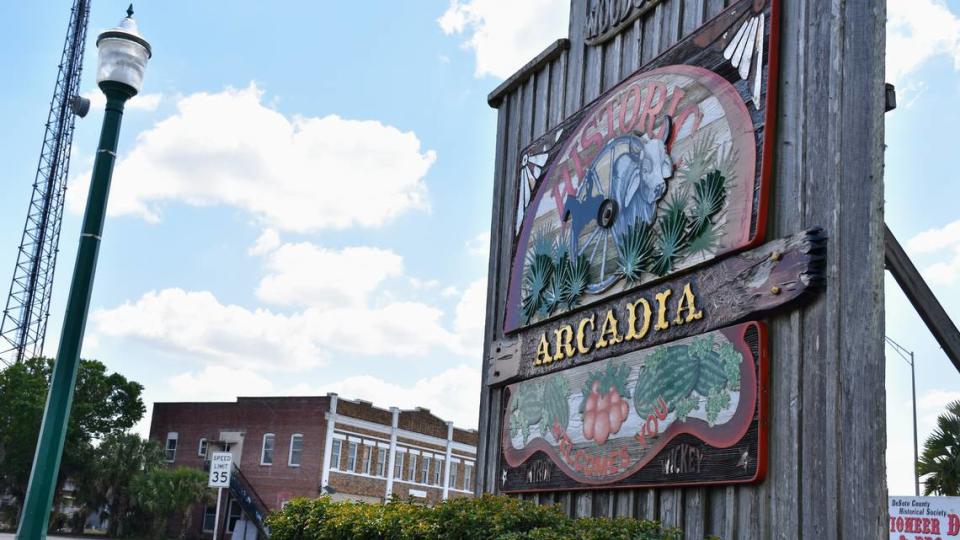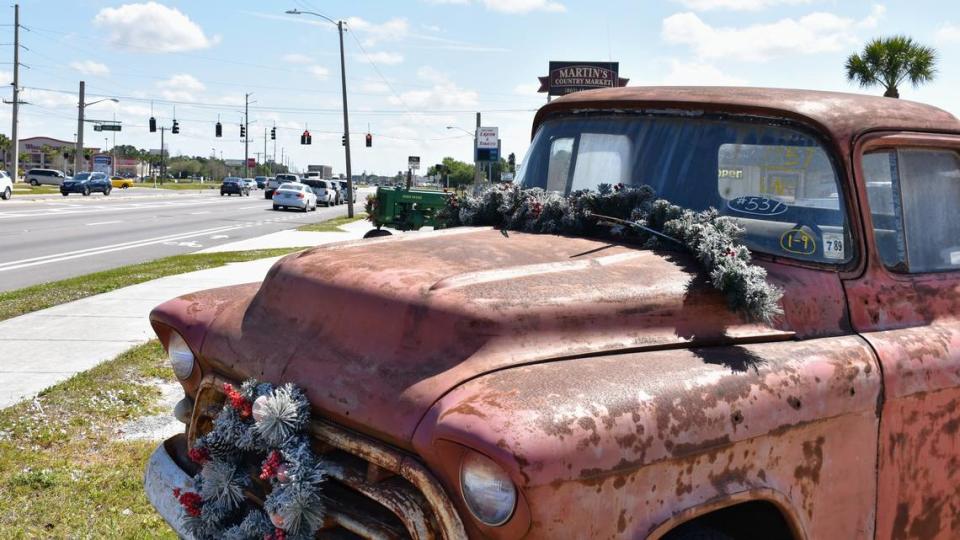‘People need to wake up’: Are Florida’s small towns prepared for a coronavirus outbreak?
Waiting in line for a roast beef sandwich at Martin’s Country Market in Arcadia, a farm town of less than 10,000 residents known for its Florida Cracker rodeos, Shirley Sebigny, 67, covered her hands in sanitizer.
It’s a precaution that could prevent the spread of COVID-19.
With a small crew of friends, Sebigny visited the Dutch market in DeSoto County for lunch earlier this week. While they’re all following the news and trying their best to avoid public outings, at least one member of the group had only recently started understanding what the World Health Organization calls a global pandemic.
“I tried to downplay it, too, until everything around me started closing,” said Sharon Hupp, 77. “Look at Disney, spring training and Broadway. That’s when I thought, ‘OK, this must be real.’
“People need to wake up,” Hupp said.
For now, Florida’s rural and small-town communities seem a relative safe haven from the novel coronavirus outbreak that’s spreading nationwide, although testing in those areas has been limited.
But if COVID-19 hits, rural counties could see their limited public-health infrastructure stretched thin. Residents are older. There are fewer doctors per capita. Hospitals are struggling and may not be able to provide enough beds or ventilators in a large-scale pandemic. And an outbreak could happen more quickly than anyone is prepared for, experts warn. Thanks to cars and Florida’s narrow geography, the countryside isn’t as isolated as it used to be.
Already, one DeSoto County firefighter is in quarantine after coming into contact with a patient believed to have COVID-19, said Chad Jorgensen, public safety director for a county of fewer than 40,000 people. (A test result, one of just eight tests performed in DeSoto as of Friday evening, is pending.)
“There’s not a lot of reserve capacity in the department as far as personnel,” said Jorgensen, whose roughly 75-person department provides fire-rescue and paramedic services for the entire county. “It’s not like heart attacks and strokes stop. This is an added burden.”
The county is seeing an uptick in 911 calls from people reporting flu-like symptoms, he said. First responders are using masks, goggles and in some cases suits made of Tyvek, material often used in hazmat gear. If they believe they may have been exposed on a call, they must decontaminate their bodies, equipment and trucks. He’s worried about data coming out of France and Italy that shows younger people are also at serious risk from COVID-19, not just the elderly.
“The reality for places like DeSoto County is we work very well in our world, but the redundancy in our system does not lend itself well to having 10 people not being able to show up to work,” Jorgensen added. “For bigger departments, that’s an inconvenience. But for us that could be very, very detrimental.”
Research has shown that infectious diseases spread more rapidly in densely populated urban areas than in rural communities. But rural areas can be easily overmatched.
“In one sense [rural areas] are a little less at risk, but if they get one case and then another and so on, they may be ill-equipped to deal with it,” said Mary Jo Trepka, a professor of epidemiology at Florida International University’s Robert Stempel College of Public Health and Social Work.
“It’s the same whether we’re small or big,” said Wayne Clemons, the emergency medical services director in Union County, Florida’s smallest. “The crisis in Miami-Dade would be the same in Union County, just on a smaller scale. We’re hoping it doesn’t get that way. I’ve been on the conference calls and heard about that, but we’re hoping and praying it doesn’t get to that point.”

So far, few COVID-19 cases have been reported outside Florida’s biggest metropolitan areas, with 563 confirmed cases statewide as of Friday evening.
Only a handful of cases had been seen in the agricultural areas between the Miami-Tampa-Orlando triangle. There had been no reports of cases in the eastern stretch of the Panhandle and in the outlying counties surrounding Gainesville and Tallahassee.
By practicing good hygiene well in advance of a confirmed case, residents and public health officials hope to keep it that way. So far, local leaders have resisted the curfews and closures seen in South Florida.
“As of right now, we’re not in any sort of jeopardy,” said Lawrence McNaul, county manager for Hardee County, just north of DeSoto. “I say that now, but who knows what tomorrow will bring.” Four people have been tested in Hardee County, which declared a local state of emergency this week.
Residents are reacting to the coronavirus threat, in ways productive and not. Groups like Rotary International, the Wauchula Lions Club and the local Republican Party have canceled outings to restaurants, which remain open, McNaul said. Shelves are being cleaned out of toilet paper and cleaning supplies. (“We need to share resources,” he cautioned.)
Until there’s a presumptive case of the virus, the county will not consider sending any of its 230 employees to work from home, according to McNaul.
“We’re a government entity,” he said. “We’ve got to function.”
The Florida Department of Emergency Management said “the state is preparing for any potential impact to our hospitals throughout the state and will continue to monitor bed capacities and provide any necessary assistance.”
The department pointed to measures like the deployment of field hospitals and requests to the federal government for more medical supplies.
It did not respond to questions about what resources the state might offer to rural police and fire-rescue departments if employees are forced into quarantine.
Thirty counties in Florida are defined as rural, based on population density and other development indicators, according to the Florida Department of Health. Rural populations tend to be less healthy because they lack the same access to insurance and medical care.
There were no confirmed cases in the Florida Keys as of Friday morning. (Monroe County is defined as rural.)
State of emergency
In Arcadia, the city council voted Tuesday evening to declare a local state of emergency.
“We have to make sure that we do the best for all of our citizens and make sure that we’re doing the things necessary to enable us to keep providing services to our community and keeping our community informed,” City Administrator Terry Stewart said.
“I think we have a group of people here who are cooperating and doing their best,” he added.
The virus presents a situation like no other for Arcadia.
“Every state is currently engaged in the same dilemma,” Stewart said. “FEMA is stretched to its maximum. When you see that every county and state in the country is dealing with the same issue, you begin to see the enormity of the problem.”

Stewart says he has been assured by top Florida health officials that if a “bloom” of coronavirus patients appears in the area, the state will provide critical resources.
DeSoto Memorial Hospital, Arcadia’s local health facility, is doing its part to prepare residents for an outbreak, too. The hospital — which has 49 beds, eight of them in the intensive care unit — began screening patients for flu-like symptoms on March 10.
The administration isn’t taking any chances with the hospital’s own staff either. If an employee travels outside of DeSoto, even for a weekend trip that didn’t involve direct contact with a COVID-19 patient, they’re still required to wear a mask at work for two weeks.
At Martin’s Country Store, owner Durrell Martin is also taking extra steps to ensure the market is sanitized.
“A lot of what needs to be done is required already, but we’re disinfecting door handles, countertops and cashier stations several times a day,” Martin noted.
While the restaurant industry in more populated areas has been decimated by Florida Gov. Ron DeSantis’ mandate that restaurants limit their seating to 50 percent capacity, as well as local municipalities ordering more complete shutdowns, that hasn’t been a problem at Arcadia’s Yellow Deli Bakery.
Even in more normal times, the shop doesn’t typically fill up with customers.
“It hasn’t been an issue for us,” said co-owner Hushi Hartgraves. “We actually want people to come in and eat with us. They don’t have to be turtles in a shell.”
(Two days after Hartgraves said that, the governor ordered all restaurants in the state closed, except for carry-out and delivery.)
The risks aren’t always clear to the public.
“From my perspective, the information we’ve been given so far on the number of cases and deaths compared to something like the Swine Flu is making people wonder why this coronavirus has become such an issue,” Stewart said. “However, the last thing you want to do is act like it’s a hoax because before you know it, you’re right in the middle of it only to find out you’re wrong.”
And in a pandemic, being wrong has huge consequences.
“If worst comes to worst, does that mean people in the National Guard with paramedic experience would wind up coming in and assisting?” asked Jorgensen, the DeSoto public safety director. “I don’t know how that works, brother.”
Miami Herald staff writers Sarah Blaskey and Daniel Chang contributed to this report.

